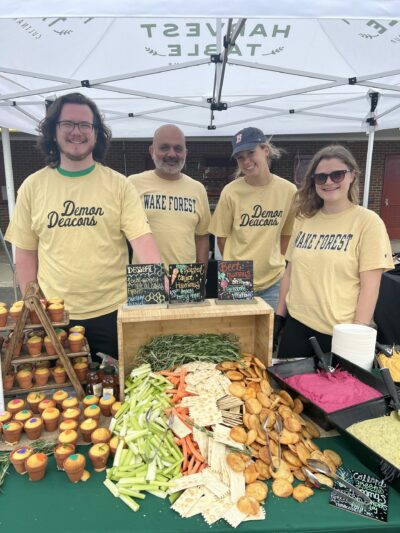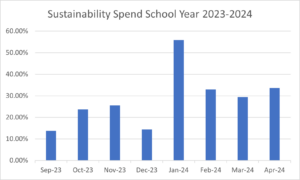Sustainability highlights from the 2023-2024 School Year

As the 2023-2024 school year comes to an end, the Deacon Dining Team is taking time to reflect on their efforts over the past year. Their goal has been to create a more eco-conscious and sustainable campus dining experience, by focusing on waste diversion and looking into more sustainable purchasing through third party vendors. The Deacon Dining staff has also been looking into community engagement through pop-up and special events, encouraging students and staff to come and learn about the natural ingredients that can be used to create healthier and more energizing meals.
Waste Diversion
Each day, our team of dedicated staff has been weighing and recording food waste in order to properly document how much was being thrown out, composted, or donated back to the community. With the help of our Sustainability Coordinator Quin Wolters, as well as the collaborating help of two interns working with the Department of Sustainability and Campus Dining, the Deacon Dining Team is able to show specifically how many pounds of food Campus Kitchen was able to divert from landfills.


The graph above shows data from Leanpath Online which tracks food waste in three dining locations on-campus. It breaks down the food waste disposition by source. For the academic year of 2023-2024, Harvest Table at Wake Forest diverted 46,868.36 total lbs of food from the landfill! Of this total number, 1,527.22 lbs were donated (yellow) and 45,341.14 lbs were composted (green).
Campus Kitchen Donation: The Pit donates an average of 2-3 pans of food per day to Campus Kitchen, along with all the donations from catering events. We expanded Campus Kitchen pickups to Hilltop Market this past semester where pickups would occur 3 times per week.
Sustainable Purchasing through third party vendors
Avg: 28.635%
Third Party Certified Products come from the following vendors:
Joyce Farms, Brasstown Beef, 4P Foods, Vernon Produce, Carolina Coffee, Chobani Greek Yogurt, Applegate, Murray’s chicken, Tractor Beverage, Niman Ranch, and others

Community Engagement Events
Piedmont Earth Day Fair
Harvest Table Culinary Group at Wake Forest University was a gold sponsor of the Piedmont Earth Day Fair in Winston Salem, NC. Our team hosted a tent providing plant forwards bites and engaged the community with educational and health promoting activities.
Fungi Forward Garden Party
On Earth Day this year the Deacon Dining Team hosted multiple local vendors for a party outside of the pit. This collaboration event with the Office of Sustainability was a huge hit as lots of students, faculty and staff stopped by to interact with local vendors and try delicious local treats!
Lunch with 4P Foods
Folks from the Wake Forest community joined in on a conversation with the founder of one of our local vendors, 4P Foods. Attendees had the opportunity to learn about sustainable food systems, how 4P Foods is making an impact and how we all can make a positive environmental impact with our choices.
Scrappy Smoothies
Some of the most impactful personal choices that we can make to impact carbon emissions are eating plant rich diets and decreasing food waste. We did an event called “scrappy smoothies” showing folks that you can make smoothies with food scraps! This was an awesome event and got guests moving on our smoothie bike.
Thanks to our hard-working interns
Parker Thompson, as the Student Engagement intern, collaborated on the planning and execution of six events throughout the 2023-2024 school year: notably a vegan vs non-vegan dip taste test event for World Vegan Day, a Fungi Garden Party on Earth Day, and Scrappy Smoothies. She spearheaded a Teaching Kitchen with Chef Ryan, where she presented to 30 students on the health and environmental benefits of plant-based proteins, before students made their own guac and enjoyed their choice of mushroom, lentil, and/or vegan chorizo filled tacos. In addition to these events, in the fall she developed a survey to gauge students’ perceptions of plant-forward dining options on campus, garnering 270 responses. In the spring, she completed a campaign aimed at educating students on the composting efforts in Smith’s Cafe where she created signage for the compost bin and hosted 3 tabling sessions where she quizzed students on their current knowledge of compostable and non-compostable items in the cafe and educated on their misconceptions.
Dan O’Connell, as the Carbon Reduction Intern, centered his focus on collecting and weighing plate-waste in the Pit. His objective was to explore the feasibility of implementing a consumer facing compost program in the Pit and to provide a glimpse into the issue of post-consumer food waste. He observed an average of 55.92 pounds of plate-waste per service period and 230.7 people who participated in the voluntary process of scraping their plates. He provided insightful inferences regarding the receptivity of students to such an initiative, the positive impact on our dining team, and the incidence of contamination. He produced a comprehensive report of his findings which has informed our team on factors to consider if post-consumer composting were to be implemented in the Pit full time. He expanded his process to catering, attending three events to scope logistics required of composting collection. Given the use of all compostable service ware at catering events, this outstanding project has provided insight to the steps we need to take as a team to introduce full time compost collection at catering events.